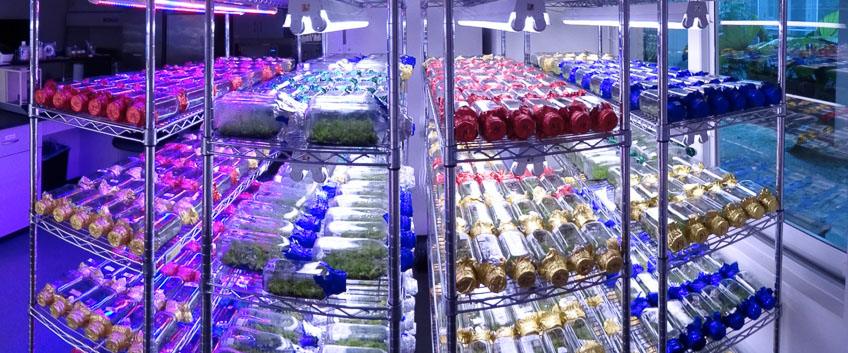Conservation

Science and Conservation at Fairchild
Fairchild is a vibrant world of botanical science and discovery, all visible and open to the public. Established as a scientific organization, Fairchild has been committed to botanical research, conservation and public education throughout its history. Fairchild science is a powerful combination of tropical field exploration, high tech laboratory science, computational analysis, and cross-disciplinary collaboration. We have a diverse team of staff, students, and volunteers working on a wide range of research and conservation projects, within our region and throughout the world. Our team is constantly teaching and learning from our visitors, members, students, volunteers and the community of scientists worldwide.
Current research and conservation projects include studies of tropical fruit crop diversity, the evolution and classification of palms, restoration of South Florida and Caribbean ecosystems, the ecology of tropical forests in a changing climate, the evolution of plants on tropical islands, and the interactions among birds, insects, and tropical plants. All of these projects have a high level of community engagement, including university faculty, K-12 and university students, and volunteers.
Fairchild’s Rare Plant Conservation Team is a small group of local plant experts whose overall goal is to reduce the extinction risk of rare plants in South Florida and the Caribbean. Since the early 1990s, the Conservation Team has worked to safeguard germplasm of our region’s rare plants, conduct rare species reintroductions, and work with local land managers to map, monitor, research, and conserve rare plant species. Facilities at Fairchild which support these local conservation efforts include: a seed research laboratory, a seed storage bank, and nursery collections of hundreds of our region’s rarest plant species. The Conservation Team also runs Fairchild’s Connect to Protect Network, a program that engages homeowners and schools to establish pine rockland gardens in order to increase the amount of native plants between fragments of globally crictically imperiled pine rockland forest, benefitting pollination and dispersal.
The Garden itself is an 83-acre living laboratory with rich representation of the global tropical flora. Our living plant collection is a source of material for genetic, chemical, anatomical, morphological, horticultural, and physiological research. As one of South Florida’s important remaining green spaces, the Garden is also a unique place to study ecological interactions among South Florida’s birds, reptiles, insects and the natural and artificial landscape.
The Fairchild Farm, located in the Redland, is a working fruit grove with an extensive collection of some of the world’s most important tropical fruit crops. These include collections of mango, avocado, jackfruit, mamey sapote, sapodilla, canistel, abrico (Mammea americana), caimito, spanish lime (Melicoccus bijugatus) and tamarind. As some of the most important foods in tropical developing countries, these crops are critical for the livelihood of countless people worldwide. Our fruit collections support research on horticulture, systematics, genetics, plant pathology, and plant breeding.
Fairchild’s natural history collections include a herbarium of more than 200,000 specimens, including palms and cycads from throughout the world, plants of Florida and the Caribbean Islands, and cultivated plants from the tropics worldwide. The Montgomery Library houses 15,000 volumes on tropical botany and horticulture. The Fairchild Archives include historic photos, manuscripts, and correspondence from the life and career of Dr. David Fairchild and other prominent South Florida botanists.These resources support research on horticulture, taxonomy and systematics, and floristics. Located on the same property as the natural history collections, the Fairchild nursery includes research greenhouse and shade house space for supports a wide variety of botanical research applications.
The new Paul and Swanee DiMare Science Village, opened in 2012, includes the Burns Science Building and Classrooms and the Hsiao Laboratories. Research facilities include laboratories for studying plant genetics, anatomy, morphology, cytology, micropropagation, and entomology.
Many important discoveries in the world of tropical plants have happened at Fairchild. Our scientists developed techniques for growing and reestablishing native South Florida plant species that are exceedingly rare and difficult to grow. Our team unraveled mysteries of how palms evolved and how their stems defy gravity to transport water and nutrients. The ecological interactions among cycads and their pollinators were first discovered and described in our labs. Fairchild scientists produced the Flora of the Bahamian Archipelago, and continue to discover new, unique elements of the Caribbean flora.
